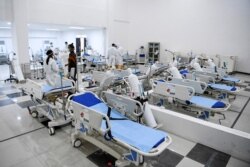Indonesia has the highest number of fatalities caused by the coronavirus in Southeast Asia, but it has not followed its neighbors that have issued travel bans, tested widely for the virus, and urged citizens to stay home from work and school nationwide.
Analysts are predicting a threat to the political prospects of President Joko Widodo, known as Jokowi, if the world’s third largest democracy does not take more aggressive measures.
Indonesia had 59 fatalities and 579 cases of COVID-19 infections as of Monday, according to the Indonesian Ministry of Health. The government has tested only about 2,000 out of its 260 million people, however, compared to hundreds of thousands of tests being done in smaller nations, while also resisting calls to mandate restrictions on movement and commerce that could further hurt the economy.
That will change as Indonesia is importing hundreds of thousands of test kits. After initially saying the archipelago nation had no coronavirus cases, the government has admitted it withheld some details about the cases that eventually emerged.
“But there is still a lack of cross-government coordination, and no clear and transparent plan for how to combat Covid-19,” said Ben Bland, director of the Southeast Asia program at the Lowy Institute, in an analysis. He added, “One of the reasons that local governments started to implement their own measures was because they were losing faith in Jokowi’s ability to manage the outbreak.”
Among the local measures taken, the capital city of Jakarta closed schools, movie theaters and other entertainment sites, and it urged residents to work from home. That is difficult, though, when according to the World Bank, more than half of the citizens work in blue-collar agricultural or industrial businesses that can’t be done remotely.
Nationally the central government has formed a health task force and issued a regulation granting limited emergency powers, including the ability to appropriate resources to fight the virus. It has ordered and distributed more medical supplies, as well as converted an old athletic village in central Jakarta, Southeast Asia's biggest city, into an emergency hospital.
Health care workers still worry about supplies dwindling as some of their colleagues have contracted the virus.
“We understand that Indonesia’s health system has limited capacity to test for COVID-19 and to manage treatment of persons with COVID-19,” the U.S. embassy in Jakarta said in an advisory to citizens.
The limited capacity has increased concern that people in general, and especially of lower incomes, will struggle to get access to medical treatment.
“No one should be left behind during this crisis,” said Eva Kusuma Sundari, a former member of the House of Representatives. "As is so often the case in times of crisis, it is those who are the most vulnerable who will suffer the most.”
The coronavirus crisis “could prove to be one of the biggest tests to Jokowi’s time in office,” according to Vriens & Partners, a government affairs advisory firm. It wrote in an analysis that Indonesia must reassure the public it is offering firm solutions — from tracing contacts of people who are infected, to securing enough ventilators, masks, and other supplies.
“If the president doesn’t firmly take the lead, we can expect that others will try, including presidential hopeful, Jakarta Governor Anies Baswedan,” Vriens & Partners said. “The economic and health crisis carries significant political risks, and Indonesians will look to strong leadership.”






